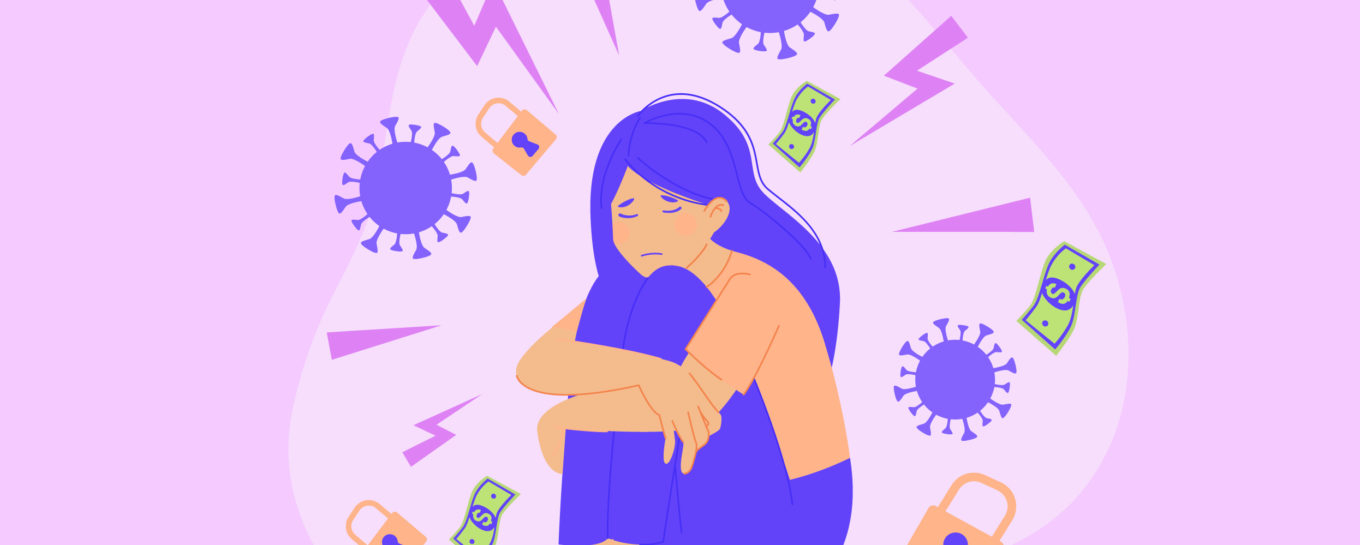Call it what you will, peace of mind, inner peace, sanity, contentment, serenity – that feeling of freedom from when your brain just won’t shut up and in bad moments you feel only marginally less negative about the world and others than you do about yourself.
In a world full of fear about the pandemic, your job, financial stress, the planet, walking home late at night, whether your kids are safe, the next interest rate rise or maybe that secret we pray never sees the light of day, most of would rather spend time with a sustained, quiet satisfaction than on a speedboat with champagne and celebrities.
It’s a different feeling from ‘happiness’ – though most of want that too.
Happiness is great but in truth it is usually a passing state, although certainly one to be grateful for. Nobody is happy all the time and if they claim to be, well, good luck to them. Contentment or peace of mind is true freedom. So how do we break the chains that hold us back from freedom of the mind in 2021? Here are some ideas.
Worrying excessively about Covid
By this we don’t mean to say it’s not a real thing, actually, quite the opposite. When we accept the evidence of reliable and dour scientists and public health experts and just do what they suggest, the surprising effect is we have less to worry about. That’s because we are not fighting it anymore – and fighting is very often based in worry and fear.
We suggest keeping yourself, your family and your workplaces as Covid-safe as reasonably possible, doing what is asked by authorities – and outside of that, concentrate on living your life. Make your time count for and with those that matter.
Too much screen time
If scrolling through Facebook a few times each day, or news websites, makes you feel connected, or if you have Netflix and just wanna chill, good for you, do it. But if you do it again, and again (and again), sorry to break it to you, but you are not living a healthy life. Period. And as for social media being sociable? Give me a break, Facebook is about as ‘social’ as a phone plan “cap” that somehow makes you spend more.
When used for a specific task, with time limits, social media can be fun and creative but used unconsciously and habitually it is empty, pretend connection. Hit the X on that tab and go get some real face-time with friends, or write someone a letter. If they are across oceans, ring them up to talk and if you can, start saving to go see them.
Putting up with financial stress
No, we are not about to suggest some wealth maximisation (aka get-rich quick) scheme. We are suggesting that continuing to live with worries about money is going to make you sick and/or keep you that way.
Financial stress is the biggest stressor for people in the United States and Australia, and as yet, employers aren’t doing much about that – although that is sure to change as corporate wellbeing programs catch up. In the meantime, do something about your low financial literacy, learn how to keep and stick to a budget, learn how to be mindful with money.
Do something about your fears over money. Be grateful for what you already have rather than always wanting more. Try to stop spending money you don’t actually have yet with too-easy tools like Afterpay or ‘pay-on-demand’. If you really need more money, then take some action: study, look for a different job and if you have the time maybe do some more work in the evenings or at weekends.
Comparing yourself to others
When did this very human trait ever work out really well? Everybody has a bad day and sometimes everyone just looks fitter, richer, like they have more friends or are just more ‘together’. They might be, but they may have very serious problems you cannot see on the surface.
You might see someone worse off and feel grateful, but deep down you may also feel a bit empty from witnessing someone else’s suffering. And why were you comparing in the first place? Perhaps from a lingering sense ‘is this all there is’? Stop distracting yourself from your own life and try practicing gratitude every day.
It’s not hard it just takes commitment. Write a gratitude list. World famous monk David Steindl-Rast suggests we can only be happy when we are grateful and we can do this by reflecting on the valuable things in life that we have been given – not things we paid for or earned. Watch his wonderful TED Talk on gratitude here.
Caring too much about others
Kindness is a really nice quality at face value, we need more of it in the world. But if you secretly wish you didn’t have to do so much for others, or expect something in return for your good deeds you may be just be avoiding the difficult reality of your life and even co-dependent.
Co-dependence is a word similar to the phrase ‘Global Warming’, in that it sounds much friendlier than what it actually is. Global warming is really dangerous climate instability, which is a bit more than feeling cosy in winter. Co-dependence is adjusting your behaviours to please others, no matter the cost to your wellbeing.
People who think co-dependence is healthy are usually thinking of interdependence. “The healthiest way we can interact with those close to us,” according to Barton Goldsmith of Psychology Today, “is by being truly interdependent. This is where two people, both strong individuals, are involved with each other but without sacrificing themselves or compromising their values.”
Being busy, staying busy
If you need something done, as the saying goes, ask a busy person. While you’re at it, give them a gold star but whatever you do, just don’t ask them how their mental health is. If you are busy all the time, what is all that white noise doing inside your head? Do you feel calm, at peace? Never forget you are a human being not a human doing.
Busy-ness can feed anxiety, that nagging chatter in your brain that undermines your self-esteem. You need to stop, at least once a day, take stock, and rest with your own thoughts. Try mindfulness meditation as a way of learning to still the mind and accept your thoughts without judgement.
From that you may learn it’s ok to be still and that you are still valuable – perhaps even more valuable – if you don’t do quite so much. You’ll probably be easier to be around too.
Staying in a job where you don’t want to excel
Maybe it’s because you aren’t respected, the boss just cut staff numbers, or froze wages again but parks his new sports car in the basement. Maybe you are doing law or medicine or IT because you think it makes your parents happy.
Whatever the reason, you feel resentful at work but you stay anyway, usually because you think financially you are trapped, or that a career change would disrupt your life too much.
But getting stuck in a job you hate is a slow death of the soul, one that invariably impacts on your mood and can lead to acting out with (or internalising) anger or with impulse spending or even addiction.
Plus you just may be holding yourself back from a bright new chapter in your life. How will you ever know if you don’t try? At least allow yourself to dream or brainstorm what might make you a happier person.
Treat your grudge like a tiny kitten
Who isn’t angry deep down about someone who harmed them in some way? Not everyone, sure, but a lot of people. If you get into a pattern of almost protecting that grudge every day, even nurturing it, guess what – it’s going to grow.
After a while you’ve held it so close that you begin showing it off, like an 8 year old with new roller skates. A resentment is not a pet, it’s a poison. Ever heard the saying ‘holding a resentment is like drinking poison and expecting someone else to get sick?’
It kinda is. Take action to deal with your resentment, work out your part in it, talk to them with a will to build bridges. And remember honesty without compassion is cruelty, or at least an invitation to an argument.
Doing nothing if you know you have a problem
You know what I’m talking about. That anger you hold, your unprocessed grief, your money problems (whether spending too much, ‘under-earning’ or just ignoring finances), your pattern of bad relationships, your secret addiction or unhealthy behaviour.
In recent years , Prince Harry has come out about the effect hiding his sadness about the effect of Princess Diana. “I can safely say that losing my mum at the age of 12, and therefore shutting down all of my emotions for the last 20 years, has had a quite serious effect on not only my personal life but my work as well,” London’s Telegraph reported Harry as saying.
Nobody is perfect or strong enough to deal with life’s train wrecks on their own. Pretending to be fine is going to stop working at some point, perhaps disastrously. But then what? Don’t waste any more time, start right away. There are different price points for counselling and support groups for all kinds of life issues from eating disorders to post-traumatic stress.
No matter what you think of yourself deep down, you deserve help. Imagine someone saying you didn’t deserve help – how would you react? So step outside your own head and go help that person – you.
Accepting reality
We touched on it above a few times: ignoring and resisting problems actually causes more grief and suffering than facing them.
That’s easy to say when it’s not us having that excruciating conversation, such as asking your lender for a hardship variation on your mortgage, or laying out the facts to the boss who doesn’t like you why you really do deserve a raise, or admitting to your partner that you haven’t been entirely honest.
Yes, uncomfortable conversations are difficult and painful. Especially when they are with ourselves. That might include actually following through to construct a budget and seeing the source of your financial problems.
But after the conversation is over, you have the beginnings of new, much healthier behaviours and habits. Yes, you have to follow through and things might get harder before they get easier, but you no longer be need to be burdened the solvable problems.
You just need to get moving and do something, beginning with the smallest of steps. The most important of those is to get real. Pretending that truly unsustainable situations – whether emotionally, financially, mentally or physically are fine and don’t need to change will just cause you unnecessary pain and drama.
Being real can sometimes hurt a bit, but as a way of thinking and understanding the world it’s both a relief and an effective change to make.
If you are experiencing distress in your life and live in Australia call: Lifeline 131114, Mensline 1300789978 or Beyond Blue 1300224636; regarding debt problems, the National Debt Helpline may be of use on 180 0007 007 , or go here for a list of hotline numbers relating to different crises.



















